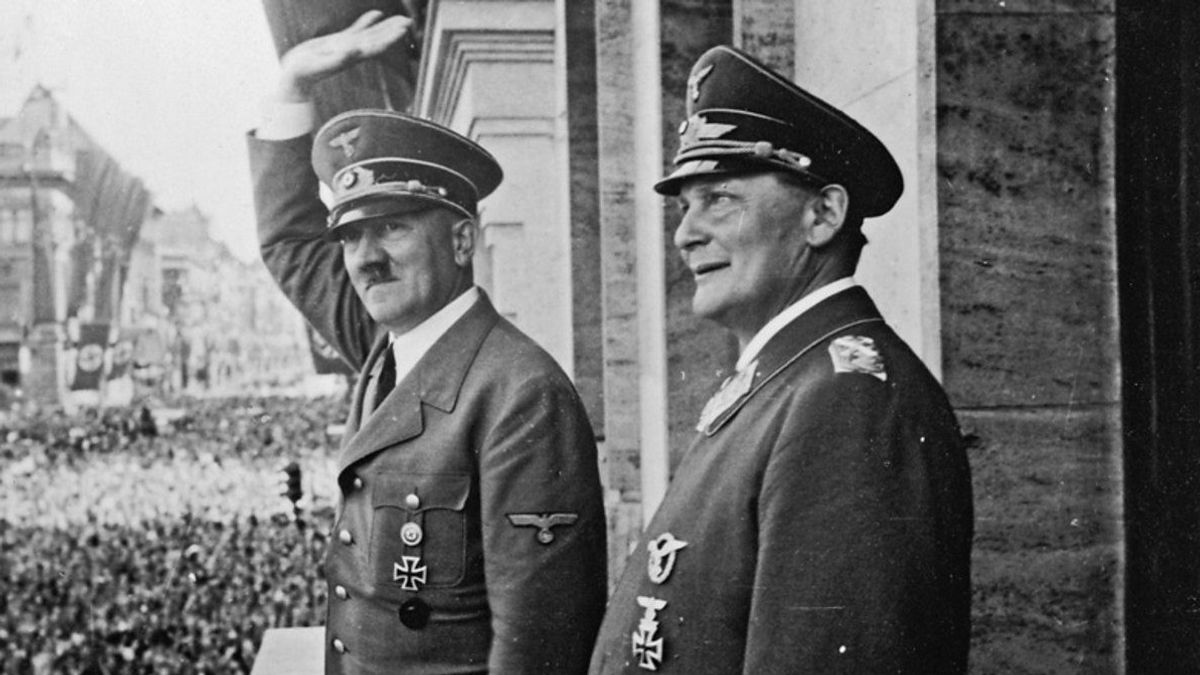
JAKARTA - The Nazi leader who was known to be very cruel and cold-blooded, Adolf Hitler, had a confidant. His name was Hermann Göring, born in Germany, January 12, 1893.
Hermann made a career in the military and received his commission in 1912. He served to serve Germany as a pilot during World War I. After the war, Hermann worked as a commercial pilot in Denmark and Sweden where he met Carin von Kantzow, who divorced her husband and chose to marry. with Hermann in February 1923.
Quoted from Biography, Sunday, January 12, Hermann met Adolf two years earlier, in 1921 to be precise. He then joined the Nazi Party at the end of 1922. As a former officer, he was given command of Hitler's Hurricane Troops (SA) by Hitler. Hermann took part in the failed Beer Hall Putsch movement of November 1923, during which Adolf tried to seize power prematurely.
Hermann was badly injured in the groin and managed to escape with his wife to Austria. Given morphine to relieve the pain of his wounds, Hermann became so addicted that he underwent treatment twice in 1925-1926 at the Långbro Mental Hospital, Sweden.
In 1927, Hermann returned to Germany and thanks to his loyalty to Adolf, it did not take long to gain a strategic position in the Nazi Party. Hermann spent the next five years working tirelessly to introduce the figures of Adolf and Nazism.
Hermann frequently contacted military officers, businessmen, and other powerful conservative figures asking for their support for the Nazis. Hermann's efforts were instrumental for the Nazi Party winning the most seats during the 1932 election and Hermann succeeded in becoming president of the Reichstag or German parliament.
Subsequently, Hermann used his powerful position to secure Adolf the title of Chancellor (Germany's de-facto leader). It was then that Adolf was able to take power and organize the greatest period of suffering and destruction of human history.
Adolf allowed Hermann to create the Gestapo or secret political police and set up concentration camps to imprison Nazi political opponents. This brutal organization also played a central role in the Holocaust by rounding up Jews across Europe. With the outbreak of World War II in 1939, Adolf even called Hermann his successor.
Hermann's addiction to morphine caused him to experience severe mood swings and made him gain weight drastically. His figure as a brave war hero, turned into a fat man an easy target for ridicule.
Hermann Göring's Failure and Adolf Hitler's Disappointment
Surprisingly, Hermann's position in the Nazi Party also helped save several Jewish lives. His younger brother Albert is an anti-Nazi who has been trying to get visas and passports for his Jewish friends since he first saw the memorial in the 1930s.
Taking advantage of his brother's position and brotherly affection, Albert often went to visit Hermann in Berlin to seek help on behalf of a Jewish friend or political prisoner.
Despite the growing Gestapo, Albert remained safe under his brother's protection until 1944, when Hermann finally reminded him that this was the last help he could do.
"My brother told me it was the last time he could help me and send me on a run," Albert said.
Hermann's love for his brother shows humanity to someone who is eager to destroy millions of innocent lives. However, Hermann's brilliant career suddenly faded in 1940. As the head of the Luftwaffe, he was responsible for a massive air strike against the enemy still standing against Germany in Europe, namely Britain. However, when the British Royal Air Force defeated Germany, Hermann took the brunt of the blame.
The situation got worse because the fate of Germany continued to deteriorate for five years. In 1943, Team Luftwaffe failed in its mission to destroy Russia and protect Germany from the Allies. The situation also did not improve because Hermann was addicted to drugs, which made his mental and physical health continue to decline.
However, Adolf still believes in Hermann, even though in the end Hermann misused that trust to continue taking drugs. In 1945, Adolf could no longer be generous to Hermann. When Adolf announced that he would stay in his Berlin bunker until the war ended, Hermann, who was then experiencing delusions, was mistaken. He assumed that Adolf gave him leadership.
When Hermann demanded to be elected Germany's new leader, the Nazi Party responded by taking all of his posts and arresting him. Not long after, on May 9, 1945, he was captured by allied forces.
Hermann is then forced to perform a detoxification of morphine and is tried for his crimes. He was found guilty of conspiracy to fight, crimes against peace, war crimes and crimes against humanity. As a result of these crimes, Hermann was sentenced to death. However, two hours before his execution, on October 15, 1946, he committed suicide by ingesting a cyanide capsule that he had smuggled into his cell.
The English, Chinese, Japanese, Arabic, and French versions are automatically generated by the AI. So there may still be inaccuracies in translating, please always see Indonesian as our main language. (system supported by DigitalSiber.id)








